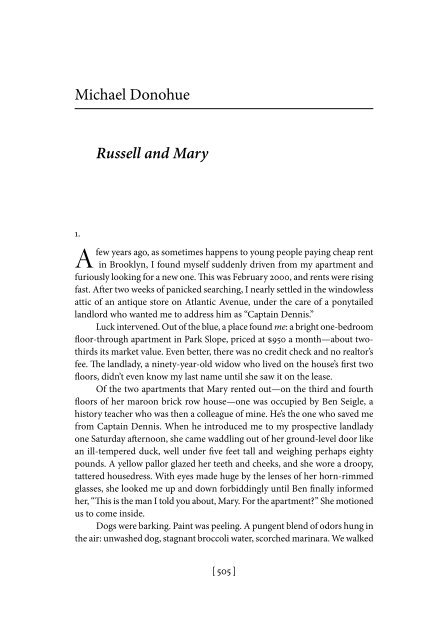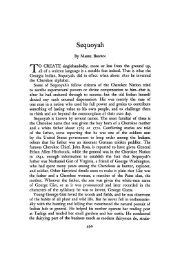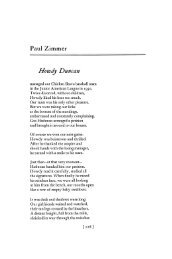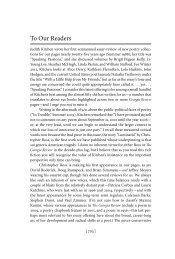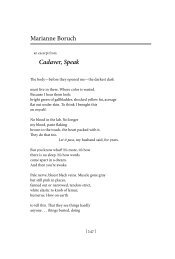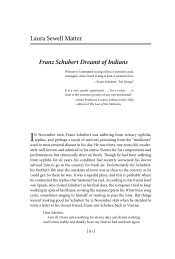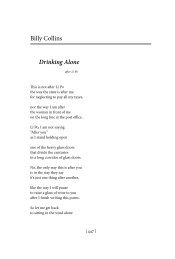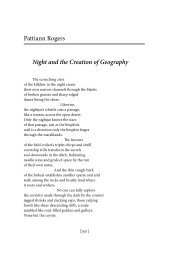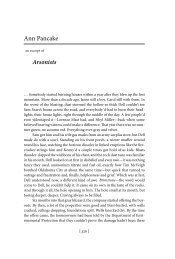Michael Donohue Russell and Mary - The Georgia Review
Michael Donohue Russell and Mary - The Georgia Review
Michael Donohue Russell and Mary - The Georgia Review
You also want an ePaper? Increase the reach of your titles
YUMPU automatically turns print PDFs into web optimized ePapers that Google loves.
508 the georgia review3.When I moved into the building, in March 2000, I learned within days why therent was so low. To get to my apartment, I had to pass through <strong>Mary</strong>’s space,<strong>and</strong> despite her slowness she often managed to be st<strong>and</strong>ing there in the hallway,by the stairwell, to greet me with a long <strong>and</strong> unintelligible tirade. Or I wouldhear her shout from another room, “Who’s there?”—as though it were an awfulsurprise to find somebody else on the premises. “Hi, <strong>Mary</strong>,” I would call outas benignly as I could. “Oh,” she would say slowly <strong>and</strong> quietly as she finallyreached the hallway <strong>and</strong> saw that I was merely her tenant, not a killer. Whetherit was three in the afternoon or ten at night, the conversation would end withher saying kindly, <strong>and</strong> too loudly, “OK, good luck! Have a good night!”<strong>The</strong>n there was the matter of the smell. As the weather turned warm thatspring, the unpleasant odor that I had noticed from the very beginning tooka terrifying turn for the worse. It seemed that <strong>Mary</strong> was losing control of herdogs, <strong>and</strong> the dogs were losing control of themselves. Turds cropped up nearthe staircase. Puddles of urine oozed their way under the radiator in the corridor.My friends were repulsed as they entered the building; some refused tocome inside.At night, in the long silences before falling asleep, I could hear everynow <strong>and</strong> then all of the house’s stray noises coming up the stairwell. <strong>Mary</strong>’stelevision was sometimes turned up too loud. She would scold her dogs. <strong>The</strong>ywould bark endlessly. A door would bang shut, again <strong>and</strong> again. Her microwavewould signal its finished job with a ding.4.One of the things I learned early on, while going through <strong>Mary</strong> <strong>and</strong> <strong>Russell</strong>’sstuff, was that he had died late in 1965—a date I gleaned from a condolenceletter <strong>Mary</strong> had stuck inside a French dictionary. Since the microwave ovendidn’t become a common household appliance until the late seventies, wellafter <strong>Russell</strong>’s death, it might well have been <strong>Mary</strong> rather than <strong>Russell</strong> who putthose contents in that box.It took a long time to get through <strong>Russell</strong>’s pornographic cartoons. <strong>The</strong>rewere dozens of them, they were skillfully drawn, <strong>and</strong> they had a certain perverseappeal: the women with their reddened, oversized nipples <strong>and</strong> theirbright smiles said things that, for all their lasciviousness, often sounded asif they had been written by someone who was disarmingly naive: “I’m not
michael donohue 509kiddin’, I want to be fucked!” <strong>and</strong> “Oh, brother, I’ve got some lovely things tosuck—want to try ’em?” <strong>and</strong> “Oh you big-peckered son of a bitch—Oh it feelsgood—fuck—fuck—fuck me forever—wear my piss-hole out.”Some, though, were genuinely disturbing—for example, the fatherdaughterscenes. <strong>The</strong>se showed tiny girls in pigtails h<strong>and</strong>ling huge paternalpenises, letting out remarks like, “When will I have big-woman orgasms,Poppa?” <strong>The</strong> father-daughter combo was common throughout the stash; inthe rarer mother-son drawings, the boy was always a scrawny eight- or nineyear-old,the mother a voluptuous redhead, <strong>and</strong> a typical exchange had the boyproposing, “I’ll do the best I can for you, Momma,” <strong>and</strong> the mother assuringhim, “You always do, Son.”Contrasting with these drawings was <strong>Russell</strong>’s more “mainstream” work—the majority of the cartoons in the box—in which he focused on radically moreacceptable themes such as Faith, Peace, <strong>and</strong> Temperance. A typical cartoon,titled “Where It Rests,” showed a large planet Earth sitting on a book. <strong>Russell</strong>labeled the globe the fate of our world, <strong>and</strong> the foundation it rests ondynamic, intelligent, christian faith.5.<strong>Mary</strong>’s decline was swift. By the autumn of 2000, her life had been taken overby a nonprofit guardian agency. Apparently a neighbor had reported her to thecity as someone who had lost control of her own affairs, <strong>and</strong> a judge appointedthe official caretaker. (I worried that one of the pieces of evidence given forher senility had been the outrageously low rent she was charging Ben <strong>and</strong>me.) <strong>The</strong> agency took control of her money <strong>and</strong> provided her with a daytimehome attendant.Late one night in March 2001, almost a year after I’ d moved into thebuilding, a sharp new smell entered the air. It was gas, <strong>and</strong> thinking theremight be a leak, I called KeySpan. Two enormous uniformed men showedup <strong>and</strong> ordered me to lead them downstairs. In the kitchen we found <strong>Mary</strong>awake—at one in the morning—st<strong>and</strong>ing <strong>and</strong> staring at a roaring television.A stove burner was turned on, flameless, shooting gas into the room. Her dogswere going bonkers, barking maniacally, <strong>and</strong> I had to shout over them, “<strong>Mary</strong>,you left your burner on!”—to which she cried out joyously, “That’s my dog!”She was unable to string together a single sentence. I felt for her, butI was also furious: this one senile gaffe could have blown up the building.
510 the georgia reviewThree nights later, smelling gas again, I stormed downstairs <strong>and</strong> found anotherburner turned on without a flame. This time ten seconds passed before sheknew I was st<strong>and</strong>ing in the same room.It was the only time I ever raised my voice with her: “If you do this again,we could die, <strong>Mary</strong>. We could die! Do you underst<strong>and</strong> what I’m saying to you?Do you underst<strong>and</strong>?”She said, “OK. Good luck. Have a good night.”6.“One of the first things I learned to do at school was masturbation,” <strong>Russell</strong>wrote. “<strong>The</strong>y showed me just how to do it. At Williams one day we all playedwith ourselves. I went home with Mahlon Kaiser <strong>and</strong> that’s what we did beforewe slept. <strong>The</strong> intricacies were discussed <strong>and</strong> the ways it felt best.” I found thesewords in <strong>Russell</strong>’s seven-page memoir about his childhood in Indiana—anunfinished, lightly annotated typescript that was well preserved in the box.Here I learned that <strong>Russell</strong> was born in 1901 <strong>and</strong> that at a young age he wantedto leave the family farm to make a career as an artist. “I could draw betterthan most kids of my age,” he wrote, “<strong>and</strong> probably was told often ‘You oughtto be an artist.’ I had such important things to do that I had no time to wasteon the farm.”Mostly the memoir consisted of small, childlike impressions full of nonsequiturs <strong>and</strong> with a special keenness for the sexual:Someone told of a man they knew who had a penis about a foot long,or more. I tried to make mine so near that as possible. <strong>The</strong> first timesperm came I was frightened <strong>and</strong> thought I was diseased or something.I was in a wagon at the time waiting for dad.I didn’t like Jake White. He did the most unreasonable things with hispenis. One day I finally got mad enough at him to keep hitting him.<strong>The</strong> rabbit whose leg I tore off, I was sorry about this <strong>and</strong> worriedfor some time.Once with one or two other boys at Potter’s Bridge I smoked part ofa cigar. It made me sick <strong>and</strong> I was afraid I was going to die.7.Three weeks after the gas scare, on a Saturday morning in April 2001, I woketo the sound of the downstairs buzzer. Somebody outside was crying <strong>Mary</strong>’s
michael donohue 511name. When I got down to the stoop, the weekend home attendant—a middleagedCaribbean woman—greeted me with a desperate shout. I let her in, <strong>and</strong>when we went down to the first floor we found <strong>Mary</strong> at the foot of her bed,crumpled up <strong>and</strong> unable to move. She could only answer our questions withgroans.<strong>The</strong>re was no telling how long she’ d been lying there—she could havefallen anytime after five o ’ clock the previous day, when Friday’s home attendanthad left the house.We grabbed an arm apiece <strong>and</strong> lifted <strong>Mary</strong> onto the bed; she was heavierthan I expected. Later that day, she was taken to Methodist Hospital with afractured leg. She would never see the house again.8.Looking back at his days on the farm, <strong>Russell</strong> thought he could pinpoint theone moment—his single tragic mistake—that had ruined everything. It happenedone Sunday afternoon in 1918.He was seventeen, still in high school, <strong>and</strong> he had gone nosing throughhis uncle’s private possessions. <strong>The</strong>re, <strong>Russell</strong> later wrote, “I found a book onsex aimed at young men—a ‘horror book’ such as those written in the previouscentury, as this one probably was. I borrowed it, read part of it, <strong>and</strong> took itquite seriously. This brought on great conflict between religion <strong>and</strong> sex, whichin turn produced a distressing symptom, great difficulty in getting my breath.It was also a frightening symptom, because when at its worst, it made me feelcertain I was going to die.”For several months after the event in his uncle’s room, <strong>Russell</strong> sufferedfrom what we would now call panic attacks—harrowing moments when heliterally believed he was on the verge of death. However, he didn’t seek medicalhelp (perhaps because he thought he’ d have to come clean about readingthe sex book), <strong>and</strong> since he was still in high school, his grades dropped offsharply.<strong>The</strong>n, quite suddenly, the panic attacks stopped. <strong>The</strong>re was no explanation.<strong>Russell</strong> thought he was cured.9.When <strong>Mary</strong> was taken to the hospital, the only ones affected in any serious waywere her dogs: Sherry, the black poodle who sniffed legs; <strong>and</strong> Judy, my favorite,the long-eared golden spaniel, still a puppy. (Judy had replaced a dog—also
512 the georgia reviewnamed Judy—who had died the previous summer.) A guardian agency officialinformed me that I was now in charge of these animals.What I found downstairs was authentically shocking. <strong>The</strong> dogs werestarving, emaciated. Judy’s ribs poked prominently out; Sherry, tied to thebasement doorknob, stared at her paws <strong>and</strong> refused to get up from her soiledpallet. Dried excrement stuck to their backsides in clumps. That first night theydevoured three cans of wet food in three minutes, then lapped hotly at my legs;Judy, in her excitement, stepped on her water bowl <strong>and</strong> sent it crashing intothe radiator.Once when Ben <strong>and</strong> I went down to feed the dogs (<strong>and</strong> clean the floor,which they never failed to desecrate with the most amazing quantities of turds),we saw that the kitchen had been ransacked. Sherry <strong>and</strong> Judy had gotten loosefrom their leashes <strong>and</strong> mauled a basket full of photographs, strewing them allover the floor. Cleaning it all up, we came across some eerie pictures of <strong>Mary</strong>as a young woman—dwarfish, broad faced, <strong>and</strong> never smiling.A week after <strong>Mary</strong> went into the hospital, Ben <strong>and</strong> I walked over there totry to visit her. Just as we got to the room, we found a nurse preparing <strong>Mary</strong> tobe moved for an X-ray, <strong>and</strong> the little inert body looked pitiful under the whiteblanket. She was barely conscious, but there was agony in her face, <strong>and</strong> as thenurse wheeled her out of the room, I saw through <strong>Mary</strong>’s yellow teeth that hermouth, tongue, <strong>and</strong> throat were black.On 3 May 2001, a Thursday, I went down to feed the dogs <strong>and</strong> found anote from the home attendant written on a piece of pink scrap paper.“Hi Mike,” it read. “<strong>Mary</strong> died this morning at 9:15.”10.A couple of years after <strong>Russell</strong>’s sex-book incident, in the summer of 1920, achautauqua passed through his part of Indiana.Named after the upstate New York lake upon whose shore the first suchprogram began as a religious retreat in the 1870s, the chautauqua evolved intoa traveling edification circus: rather than clown cars, merry-go-rounds, <strong>and</strong>bearded ladies, it offered religion <strong>and</strong> history lectures, art exhibits, <strong>and</strong> musicalrevues.At the Indiana show Mr. Pitt Parker, a “chalk talker”—an entertainerwho drew cartoons as he spoke—caught young <strong>Russell</strong>’s eye. According to theIndianapolis Times—in an article written in 1934, when <strong>Russell</strong> was the paper’s
michael donohue 513political cartoonist—he “got the ‘bug’ badly,” <strong>and</strong> after graduating from highschool he spent several academic years at Wittenberg College in Ohio (withoutever getting his degree) <strong>and</strong> the summers as a “tent man” on the chautauquacircuit.He was an artist now, a performer. This was his boyhood dream. Withthe rest of the chautauqua crew he roamed all over the country, <strong>and</strong> not oncedid the specter of those panic attacks appear—not even when his mother diedearly in the twenties. <strong>Russell</strong> had untangled himself from the farm.When he went back to his home county, it wasn’t to rejoin the family butto propose marriage. My l<strong>and</strong>lady’s predecessor was a pretty local girl namedHelen, <strong>and</strong> <strong>Russell</strong> married her on 1 July 1928.11.A week after <strong>Mary</strong>’s death, when I got home from work <strong>and</strong> went downstairsto feed the dogs, I found that they’ d been taken away. <strong>The</strong> agency that hadmanaged <strong>Mary</strong>’s affairs now withdrew from the scene; their duty, they said,had only been to manage <strong>Mary</strong>’s final days. Now the city would take over theproperty, because there were no relatives <strong>and</strong> no friends. <strong>The</strong> agency had paidfor the burial with <strong>Mary</strong>’s own money.<strong>The</strong> fridge had not been opened for a month. <strong>The</strong> milk was solid as tofu<strong>and</strong> had to be flushed down the toilet, the potato salad was navy blue, <strong>and</strong>some pasta in a Tupperware container looked surprisingly edible. All got triplebagged.12.<strong>Russell</strong> had joined the Indianapolis Times in about 1931, starting out as the“lodge page editor” <strong>and</strong> rising quickly to the post of cartoonist. It was amazinggood fortune. <strong>The</strong> only problem was that at about the same time his panicattacks began again.In the peppy 1934 Indianapolis Times profile, <strong>Russell</strong>strides down the street each morning on his way to the Times officein deep reverie. He does his thinking while he’s taking his morningconstitutional <strong>and</strong> should some brazen passerby let loose with one ofthose piercing whistles to attract some friend, up comes his head witha jerk. He is almost a young Puritan, but his thoughts at that precious
514 the georgia reviewmoment are far from Puritanical. For people who whistle on the streetare his pet peeve—his only one, in fact.[<strong>Russell</strong>] at one time expected to become a minister, but instead, hasdrifted to the other extreme. He has become a newspaper cartoonist,<strong>and</strong> now he strives for effect in his cartoons on the Times’ editorialpage instead of driving home his point from the pulpit.Also from this period was a letter written from Spelman College on thestationery of the NAACP journal the Crisis: the letter requested that <strong>Russell</strong>finish up a particular cartoon <strong>and</strong> then give the journal permission to run it;the signature on the letter was that of W. E. B. Du Bois.Clearly, <strong>Russell</strong> <strong>and</strong> Helen never should have left Indiana. <strong>The</strong>y seemto have been happy there. <strong>Russell</strong> was a local star whose opinions were beingheard. Kiwanis <strong>and</strong> Rotary clubs asked him to speak at their luncheons.But <strong>Russell</strong> was too ambitious to stay put. His idol Rollin Kirby, who in1922 had won the first Pulitzer Prize given for editorial cartooning, drew forthe New York Post; <strong>Russell</strong> must have figured that to hit it big, he would haveto head east. He moved to Connecticut, alone at first, to put himself withinstriking distance of Manhattan. Helen remained temporarily in Indiana, <strong>and</strong> inJuly 1937 she got a postcard from her husb<strong>and</strong> that noted, “One of my cartoonswas carried in a Camden, NJ paper. Gotta go to NY tomorrow. We’ll get thereyet.”13.At the end of June 2001, shortly after <strong>Mary</strong>’s death, Ben moved to Chicago,leaving me alone in the house. <strong>The</strong>re was still no indication of when anyonewas going to step forward <strong>and</strong> do anything. No relatives arrived. No city officialseither. I paid no rent. <strong>The</strong> place was mine. That summer, on vacation fromteaching, I spent many afternoons in <strong>Mary</strong>’s backyard—reading the paper,basking in the sun, <strong>and</strong> stretching my legs out among the weeds.I dreamed of taking over the place—maybe a judge would just sign overthe house to me, bowing to my rights as sole tenant; maybe I would retire fromteaching <strong>and</strong> become a l<strong>and</strong>lord, if not a full-fledged real estate mogul. MaybeI had become <strong>Mary</strong> <strong>and</strong> <strong>Russell</strong>’s heir—by default.In the end it was the gas company that ruined my little paradise. I wentout of town for three weeks, <strong>and</strong> when I came back in early August there wasa piece of paper posted to the front door, warning that gas service in the whole
michael donohue 515building was about to be cut off. <strong>The</strong> unpaid bill was for more than thirteenhundred dollars.I called <strong>Mary</strong>’s former guardian agency to alert them to the bill, <strong>and</strong> aperson there told me to call the Public Administrator’s Office of Kings County.Even now, it is a complete mystery to me why they had not told me to do thisimmediately after <strong>Mary</strong>’s death—or why they had not done it themselves.“Be sure you have the date of death,” I was told. “<strong>The</strong>y’re really disorganizedin that office.”14.When <strong>Russell</strong> <strong>and</strong> Helen moved to Manhattan in 1938, life must have seemedfull of promise. <strong>Russell</strong>’s idol Kirby even wrote him a personal invitation to stopby the Post for advice. But one thing kept getting in the way: at any moment,without warning, <strong>Russell</strong> might lose his breath <strong>and</strong> be seized by the fear ofdeath.“I went from one doctor to another,” <strong>Russell</strong> wrote of this time, “who didnot underst<strong>and</strong> the cause of my breathlessness. I experimented with eatingvery light meals five times a day, fletchering [that is, chewing his food veryslowly], fasting, eliminating meat from my diet, drinking hot water, holdinga hot water bottle on my stomach, <strong>and</strong> for months I wore an abdominal beltbecause one doctor said I had ‘fallen stomach.’ ” He went to a chiropractor <strong>and</strong>an osteopath, tried deep breathing <strong>and</strong> exercise, <strong>and</strong> sought relief in cod liveroil, yeast, <strong>and</strong> a myriad of antacids. His condition only got worse.Crippled by intermittent terror, he discovered that a young doctor livedin his building, <strong>and</strong> one night, in the midst of an especially hideous episode,with Helen weeping by his side, <strong>Russell</strong> summoned his neighbor <strong>and</strong> beggedfor help.It came in the form of a grain-<strong>and</strong>-a-half capsule of Seconal—an extremelyaddictive barbiturate that in those days was sometimes prescribed to treat anxiety.When the drug kicked in, <strong>Russell</strong> was at last able to catch his breath; buthe would take the drug every day for the next twenty-five years.Near the end of his life, when he claimed to have put his addiction torest, <strong>Russell</strong> wrote a memoir—seven pages in typescript, with extensive revisionsin pen—titled “I Was a Barbiturate Addict.” This explained to me why<strong>Russell</strong>’s box had such a scant record of the early 1940s: during that time,he had gradually stopped cartooning <strong>and</strong> begun working in hotels—because
516 the georgia reviewhotels had resident physicians who could write <strong>Russell</strong> prescriptions. Seconal,it turned out, was even more harmful to his cartooning career than the panicattacks had been.No evidence remains of what Helen did during <strong>Russell</strong>’s unraveling.Somewhere, there must have been a pivotal moment, maybe a public breakdown.All I know is that in the spring of 1945, <strong>Russell</strong> l<strong>and</strong>ed in the Pilgrimpsychiatric hospital in West Brentwood, Long Isl<strong>and</strong>.15.“That guardian agency does not have a very organized office,” grumbled Mr.Hill, the Public Administrator investigator I reached on the phone. “<strong>The</strong>ydidn’t give me the heads-up on this.” He was cranky when I told him whathad happened, <strong>and</strong> he audibly scoffed at any mention of the guardian agency.I had called the right place.Mr. Hill <strong>and</strong> his partner, Mr. Sultan—both gray haired <strong>and</strong> mustachioed—firstvisited the house during a mid-August heat wave, waving theirbadges <strong>and</strong> taking Polaroids of all the rooms. <strong>The</strong>y were amiable, brusque,fact-loving men who held clipboards <strong>and</strong> wrote things down with fat felt pens.Mr. Sultan took a Polaroid of me st<strong>and</strong>ing next to Mr. Hill.I learned that in cases like this, when a property owner dies withoutheirs, Mr. Hill <strong>and</strong> Mr. Sultan show up <strong>and</strong> set things in order. <strong>The</strong>y comb thepremises, searching for anything that might help the government take overthe estate—a will (if they’re lucky), the traces of living relatives, keys to safetydepositboxes, bank account numbers. Mr. Hill explained that he would makea full inventory of all the items in the house—except mine, of course; theneverything would be cleared out <strong>and</strong> anything of value sold. Finally, the houseitself would be auctioned off. “What about me?” I asked.“You don’t worry about you,” said Mr. Hill, dad-like. “You have a lease—right? You are gonna be OK.”“Do you guys do this all day?”“Yep,” said Mr. Sultan proudly. “For all of Brooklyn.”16.From the time span of <strong>Russell</strong>’s stay at the mental institution, I found thirteenletters from him <strong>and</strong> eight from Helen, who remained in New York <strong>and</strong> visitedhim on Sundays. Helen’s letters try to soothe <strong>and</strong> reassure her husb<strong>and</strong>,
michael donohue 517while <strong>Russell</strong>’s try to convince his wife that he is soothed <strong>and</strong> reassured. Helenrefers to her visits—“I couldn’t believe it when the nurse said it was time toleave”—<strong>and</strong> sometimes makes gentle jokes: “Yesterday I went to the doctor. Hethinks I’ll live—<strong>and</strong> I’m afraid so too.” But her typical tone is serious: “Pleasedon’t worry or feel too alone out there. I can take care of things <strong>and</strong> I have thevery best guidance.”Being separated strained their marriage. “I’m hoping we’ll find someother way to live than we were before I came in here,” <strong>Russell</strong> wrote her. “Can’twe figure out a better way than we’re doing now?” By the time of this letter, hehad received (according to his own count) twelve shock treatments <strong>and</strong> wasfacing another eight before his time was up.At last, <strong>Russell</strong>’s tone gets frantic: “I certainly hope the treatment here getsme fixed up, partly because I want our status settled. I want you but if I don’tget well I don’t like the idea of being a burden to you any longer. MeanwhileI have more memories of your sweetness than you realize. <strong>The</strong> rest is—justlife.”17.Mr. Hill <strong>and</strong> Mr. Sultan pasted seals over the doors to <strong>Mary</strong>’s second-floorrooms, but not over the door at the bottom of the stairs that led to her kitchen<strong>and</strong> bedroom. I was curious to see what they had done—<strong>and</strong>, to tell the truth,I was starting to feel that the house was my personal domain—so one Sundayafternoon in late August, I went down there to take a look.Back in May, the dogs had done a decent job of wrecking the kitchen,chewing up papers <strong>and</strong> spreading photographs all over the floor. But that waspaltry compared to what Hill <strong>and</strong> Sultan had done. <strong>The</strong> men had mutilatedthe place. <strong>The</strong> kitchen was carpeted wall-to-wall in speckled white paper, <strong>and</strong>boxes of knickknacks had been sprinkled on top. A barefoot person might nothave escaped alive. Cracked-glass picture frames cast spider webs over smilingfaces; they’ d probably been knocked over when the mattress was hurled againstthe wall. I noticed a framed picture of young Queen Elizabeth II, resting ona Certificate of Appreciation dated 20 September 1994, from Feed America,thanking <strong>Mary</strong> for her assistance to “America’s disaster victims <strong>and</strong> homeless.”<strong>The</strong>re, too, was her Claimant’s Insurance Book from 1956, noting herdeparture from Gracette Lingerie on Madison Avenue <strong>and</strong> documenting hertwenty years’ experience as a seamstress. <strong>The</strong>re was a booklet entitled “<strong>The</strong>
518 the georgia reviewTruth About Constipation” by Victor H. Lindlahr. Soiled rubber gloves, thecalling card of the Public Administrator, were scattered about. A lone, massivefly flew desperately from room to room.Mixed in with the rubber gloves <strong>and</strong> the ripped envelopes were dozensof photographs. One showed <strong>Mary</strong>, maybe thirty years old, posing with neatlyfolded h<strong>and</strong>s in front of a brownstone stoop. She wore a fresh floral-print dress<strong>and</strong> a morose expression.<strong>The</strong> photo that interested me the most was a small, black-<strong>and</strong>-white portraitof a man. Appearing to be in his sixties, he wore a dark suit <strong>and</strong> blackframedglasses. With a visage of almost poignant benevolence, he was holdingup a stick with a parakeet perched on it. He was looking the parakeet straightin the eye, <strong>and</strong> smiling.This was my first glimpse of <strong>Russell</strong>.That photo was the only thing I removed from the wreck. <strong>The</strong> followingWednesday, the Public Administrator’s moving men pulled up to the housefor the first round of cleanup.18.Among the relics of <strong>Russell</strong>’s hospital stay I also came across something ofmore prurient interest: a sheet of notebook paper covered on both sides inpencil-scrawl. At the top he had written, “Why should strict <strong>and</strong> uncompromisingmonogamy be socially useful? Why—if the wife agrees—should a husb<strong>and</strong>not have intercourse with a widow or a divorced woman? Why shouldnot a wife—if the husb<strong>and</strong> consents—have intercourse with a husb<strong>and</strong> whois unfortunate enough to have a crippled or hopelessly sick wife? What is thevirtue in denying for denial’s sake?”Below this paragraph is a list of questions. “How serious were you whenyou mentioned it? What did you expect me to say?” “How would you feel if Idid the same?” “What would you do if I got out in a month? You are not planningto quit. I would be willing that you go to him even on nights when I wasout. I would not only not interfere. I would help wherever I could. Would yoube willing that I do the same? And would you feel our marriage was over if Idid?” At one point, he simply lists ten women’s names—perhaps his preferredpartners, should this arrangement be implemented.Whichever path they chose, there was no doubt that the marriage deterioratedrapidly during <strong>and</strong> after his time in the hospital. Nothing in the box
520 the georgia review20.In another of <strong>Russell</strong>’s many unpublished memoirs, this one called “My EmotionalEscape to Mexico,” he says he went down south to recover from hisshortness of breath—leaving out any mention of the barbiturate addiction,the ineffectual hospital stay, or the dissolving marriage. <strong>The</strong> memoir is a longwindeddescription of Mexico, with special emphasis on the citizens’ sexualattitudes <strong>and</strong> practices.<strong>The</strong> most bizarre piece of evidence from <strong>Russell</strong>’s Mexican adventure is adocument dated 24 September 1948 <strong>and</strong> marked “Requirements for MarriageLicense in Arkansas.” It is an application for marriage between him, “age 47,”<strong>and</strong> one Maria Luisa Contrera-Romo, of Nuevo Leon, “age 34.” So it’s possible,though hard to believe, that <strong>Mary</strong> was actually <strong>Russell</strong>’s third wife. PoorSeñorita Contrera-Romo did not turn up anywhere else in the microwave ovenbox.21.Finally, gutted of everything but me, the house was ready for auction. <strong>The</strong> nextSaturday <strong>and</strong> Sunday, a soft-spoken court officer opened up the building, <strong>and</strong>about seventy sets of people had a look. <strong>The</strong>y had learned about my house froman ad the Public Administrator had put in the newspaper.Many were frightened by the urine-logged carpets, the sagging ceilings,<strong>and</strong> the comically unstable staircase. A few were probably turned off by mypresence, since a tenant can slow down renovation. But for the most part themood was convivial: people moved through <strong>Mary</strong>’s empty rooms, flushed hertoilets, ran her faucets, chuckled at her flypaper. <strong>The</strong>y pointed out details inthe fireplaces <strong>and</strong> ceilings; they argued with one another about the building’sdimensions; they speculated on the place’s value <strong>and</strong> on how much repair wasneeded.I talked to dozens of people. Many were feeling me out, maybe to see if Iwas a reasonable tenant; my lease wouldn’t run out until the following March,<strong>and</strong> whoever bought the house would be stuck with me until then. Neighborscame to see the inside for the first time. “What a tough cookie <strong>Mary</strong> was!”somebody said. “Look, she put the radiator right in front of the fireplace.”“What’s going to happen to you, Sweetie?”It seemed that whenever I found myself alone in a room with one ofthese strangers, before long I was listening to a confession of the most personal
michael donohue 521information. One man, probably in his late sixties, told me about his childhoodin Pol<strong>and</strong>, his family’s flight to Siberia during World War II, <strong>and</strong> his returnhome to find everything destroyed. <strong>The</strong>n he suddenly frowned, said “I nevertalk about this,” <strong>and</strong> left.A hardware store owner explained to me his new philosophy of life. “I’mstarting over, Mike. I have a new woman, <strong>and</strong> a new life, <strong>and</strong> I think thishouse—this house is it.”22.Mexico was a bust. When <strong>Russell</strong> returned to New York in 1949, he moved intothe Hotel Chesterfield on West Forty-ninth Street, where the McGraw-Hillbuilding now st<strong>and</strong>s. His marriage finished, he briefly aspired to go abroad;I have a letter from the Government of India’s Ministry of Education, dated19 July 1949, informing <strong>Russell</strong> that “it is regretted that there is at present nosuitable post to be offered to you.” (Mrs. Asghar, education officer, kindly tellshim, “We are glad to know that you have a special interest in India.”) Probablyliving off what was left of his small inheritance, he began to draw cartoonsagain, took a class on magazine writing at City College, <strong>and</strong> wrote “My EmotionalEscape to Mexico.”A letter from a professor at the University of Chicago, written in May 1951,begins, “In answer to yours of the 25th, I think the most authentic statementon the chances of going insane is to be found in . . .”23.<strong>The</strong> morning of the auction I called in sick, then showed up early <strong>and</strong> took myseat in Room 319 of the Supreme Court building, that drab edifice on CadmanPlaza in downtown Brooklyn. I wasn’t there to buy the house, of course; I wasthere to stay on top of things, to defend my interests, to know who my newl<strong>and</strong>lords were at the very moment they assumed the role.<strong>The</strong> courtroom was st<strong>and</strong>ard looking, except that instead of a judge upfront there was a wide panel of clerks <strong>and</strong> accountants. About two hundredpeople trickled in <strong>and</strong> lined up to register for the neon-green cards that wouldlet them bid on any of the nineteen lots for sale. I recognized many peoplefrom the open house, including a pair of siblings named Suzann <strong>and</strong> George,the bidders I liked the best; the hardware store owner; a tall guy with a baby;a couple of chipper newlyweds; <strong>and</strong> a duo of obese Hasidim in black suits.
522 the georgia review<strong>The</strong> hardware store owner, eyes closed, was praying by the back wall,moving his lips visibly.24.<strong>The</strong> last verifiable artifact from <strong>Russell</strong>’s pre-<strong>Mary</strong> era was a note-to-selfscrawled on a sheet of lined paper—maybe a page torn from a diary. “I havenothing left,” he wrote. “No job, no wife, no home, no friends, no education,no religion, no money. I don’t even have clothes. . . . Today I have been worried,wondering whether the relatively good days will ever return. Will I everbe able to think again?”<strong>The</strong> good days would return soon enough. Sometime in the winter orspring of 1952, <strong>Russell</strong>—fifty-one years old <strong>and</strong> broke—met a short, severelookingforty-two-year-old seamstress named <strong>Mary</strong>. She had grown up inBrooklyn <strong>and</strong>, according to the custom for unmarried Italian women, stilllived with her parents. I don’t know how the two first got acquainted, themicrowave box providing no record of the event. But in June of that year <strong>Mary</strong>wrote <strong>Russell</strong> two letters that ended up in my h<strong>and</strong>s. Her stationery was pink,her spelling erratic.<strong>The</strong> first letter, written Sunday night, 15 June 1952, begins, “Darling: Thisis my first letter from me. This is a confession. You did not know how seriousit was for me to be in love with you.” She says that <strong>Russell</strong> is “7 or 8 milesaway”—he must have found summer employment outside the city. “I’m willingto drop out of existence, + find myself in your arms next Sunday instead, givingyou my love. I can easily give you my life, + you know it, will you ever find itout, you took me so innocently. Please don’t run away from my life. I love youso much more now that you are away. Write as often as you can, + rememberdarling, I love you, I worship you—I idolize you + you know it. I send manymany kisses. Don’t forget me darling.” She signs off cryptically, “Enclosed youfind my picture. You know the reason.”I don’t know if he ever wrote her back—of about a hundred letters in thebox, not a single one was from <strong>Russell</strong> to <strong>Mary</strong>.25.My house was first on the list to be sold, <strong>and</strong> the upset price, where biddingbegins, was set at $500,000. <strong>The</strong> auctioneer, a middle-aged man in a sharpdouble-breasted suit, said, “Do we have five hundred?” <strong>and</strong> after a few seconds
michael donohue 523of hesitation, the first card went up—Suzann. <strong>The</strong>n the tall guy, the hardwarestore owner, the chipper newlyweds. Neon-green cards were popping up allover the room—everybody wanted <strong>Russell</strong> <strong>and</strong> <strong>Mary</strong>’s house.Bidding moved swiftly through the five hundred thous<strong>and</strong>s <strong>and</strong> into thesixes, driven up by amateurs too eager to restrain themselves. You could spotthe experienced bidders, because they entered the fray late <strong>and</strong> would onlyraise their cards when the house was almost in someone else’s h<strong>and</strong>s.By the high sixes only three bidders remained—the tall guy, the Hasidicduo, <strong>and</strong> a stranger with a menacing real-estate-mogul expression. NaturallyI rooted for the only amateur st<strong>and</strong>ing, but alas, he was done in by the menacingstranger’s bid of $700,000. <strong>The</strong>re was then a moment of quiet; the crowdglanced at the Hasidic duo, then at the menacing stranger, then back at theduo. With a second’s hesitation that I suspect was only for dramatic effect, oneof the Hasidic men bid five thous<strong>and</strong> more, <strong>and</strong> his rival crumbled.“Sold!” cried the auctioneer.26.By October 1953 at the latest—the date of a congratulations card I found inthe box—<strong>Russell</strong> <strong>and</strong> <strong>Mary</strong> were married, <strong>and</strong> by the following year they hadmoved into the Park Slope house.<strong>The</strong>se middle-aged newlyweds kept a distance from their neighbors: theones who were still around in 2001 couldn’t tell me much about either of them.In the twelve years of their marriage, <strong>Mary</strong> kept working as a seamstress, whileher husb<strong>and</strong> stayed home to draw cartoons, care for his pet parakeets, <strong>and</strong>write articles for tiny Christian publications. He did not, apparently, contributeto the purchase of the house.In fact it isn’t clear how <strong>Russell</strong> made a living during these years, if he didat all. He had, in the past, been a full-time cartoonist; now he was an armchairintellectual—an amateur psychologist, ornithologist, <strong>and</strong> poet. In the tranquilrealm of his second-floor living room, he must have regularly perused hisheavy tomes on abnormal sexuality <strong>and</strong> psychology. He wrote letters to publicfigures, including one to Jawaharlal Nehru of India congratulating him on“keeping the peace.” He pitched articles to national magazines. He sent a lettersuggesting ways to improve the shuttle bus service at Idlewild Airport. Hewrote to prominent scholars asking them complicated questions, the renownedgeographer Ellsworth Huntington of Yale University writing back to refer Rus-
524 the georgia reviewsell to part 3 of his Mainsprings of Civilization <strong>and</strong> its explanation of climate’sinfluence on North American robustness.He also wrote verse:I strolled this afternoon beneath the old <strong>and</strong> rugged pineWhere one sweet evening years ago I asked you to be mineI think I found the very spot where we were sitting thenAnd ah but it was good to sit <strong>and</strong> reminisce again!Meanwhile, <strong>Mary</strong> brought home the bacon. In 1951 <strong>Russell</strong> was a drug addictwith no prospects; by 1954 <strong>Mary</strong> had transformed him into a drug addict witha spacious Park Slope house <strong>and</strong> no need to work. He had his books, his wife,his parakeets, <strong>and</strong> of course his pills.<strong>Mary</strong> gave <strong>Russell</strong> shelter—which, unfortunately, leaves him open tocynical evaluations. He was a fairly desperate man when they met. Did hereally fall in love with this homely old maid, or was it that he found himselfconveniently in the arms of a woman with a house to share? (<strong>The</strong>re was almostnothing in <strong>Russell</strong>’s box to provide information on <strong>Mary</strong>’s parents, but documentsfrom <strong>Mary</strong>’s destroyed kitchen showed that the house, purchased circa1953, belonged only to people with <strong>Mary</strong>’s maiden name.)<strong>The</strong>re’s a love poem in the box which, in my kinder moments, I like tothink is <strong>Russell</strong> writing to <strong>Mary</strong>. It’s a first draft written messily in pencil.I lived a lifetime in one glorious weekThat lifetime started when I first kissed youAnd I had such love as all men seekHow could such a fragile lovelylittle thing as youBecome a lighthouse, strong <strong>and</strong> highto shed its beamsUpon the turmoiled waters of my life?After two illegible lines, the poem ends:I’ d trade the rest of my life dearfor one more night with you
michael donohue 525It could be referring to <strong>Mary</strong>. <strong>The</strong>re was no doubt, even to me, that <strong>Mary</strong> hadrescued <strong>Russell</strong>. But the poem’s tone seems a little inappropriate for such athoroughly attainable object of desire as <strong>Mary</strong> must have been.This mattered to me. I wanted <strong>Mary</strong> to be <strong>Russell</strong>’s savior. He may havebeen an awful poet, but I wanted him to be a good man. I wanted him <strong>and</strong><strong>Mary</strong> to have been happy. And how could they not have been? <strong>Russell</strong>, whohad recently been w<strong>and</strong>ering the East Forties high on Seconal <strong>and</strong> dreamingof India, <strong>and</strong> <strong>Mary</strong>, who had never lived apart from her parents <strong>and</strong> had toiledas a seamstress for two decades without finding a husb<strong>and</strong>—they had foundeach other, they had joined together in a life of shared solitude.And, according to a poem written late in <strong>Russell</strong>’s life—in typescript, withcorrections in red pencil—they had conceived a child:It was dusk when we began our long journey homeward,And I noticed <strong>Mary</strong> leaned a little moreOn my arm than when we started from the village,And she walked a little slower than before.As the years go by we both are growing older,And I know we haven’t very long to stay.<strong>The</strong>n we’ll tread the path that Bobbie took before usAnd we’ll meet him in some other world some day.And I think perhaps the Lord will let us have himAs our little boy, our little man again.And we’ll have him with us there again forever,In a l<strong>and</strong> devoid of sorrow, tears, <strong>and</strong> pain.Mawkish lines, I know, but they made me put aside my suspicions <strong>and</strong> mycynical conclusions. <strong>The</strong>y made me ready to believe in <strong>Russell</strong> <strong>and</strong> <strong>Mary</strong>’smarriage, in their persistent, childless, weary love. He had washed up, nearlydrowned, on her shores, <strong>and</strong> she had been there, as he said, like a lighthouse,shedding her beams on him. Bad metaphor, maybe, but this was still a lovestory—though <strong>Russell</strong> spoiled the mood by v<strong>and</strong>alizing his poem. At the top heangrily scrawled bad, <strong>and</strong> then at the bottom under the last line, amateurish,in red pencil. Whether he was disavowing the poem’s form or its meaning, Iwill of course never know.
526 the georgia review<strong>The</strong> box had not a single other trace of Bobbie, <strong>Russell</strong> <strong>and</strong> <strong>Mary</strong>’s “littleman.”27.I imagine it this way: When <strong>Russell</strong> died in 1965, <strong>Mary</strong> discovered the collectionof relics from his first life, the one she was never part of. She found that inthe place where <strong>Russell</strong> kept his precious possessions, much more space wasreserved for Helen than for herself. She found that in his free time her husb<strong>and</strong>was drawing cartoons depicting grown men having sex with children <strong>and</strong> thatall along he had been watching the suicides of the world with a fascination thatbordered on envy. No wonder she was a mean old woman.“<strong>Mary</strong> was a terrible bitch—forgive me, I know she’s dead, but it’s true,”said an elderly man named Tom, who lived a few doors down <strong>and</strong> whoapproached me once as I sat on the stoop of the house during the PublicAdministrator’s cleanup. “<strong>Mary</strong>’s husb<strong>and</strong> was a very nice man,” he went on.“He kept birds in the house.” But <strong>Mary</strong> was mean. She screamed at tenants. Sheharassed passersby. She never cooperated with the block association. “Lookhere,” he said, pointing to the thirty-foot-high tree in front of the house. “Shedidn’t even want this tree to be planted. She screamed <strong>and</strong> screamed when weplanted it!”One time, he recalled, when one of <strong>Mary</strong>’s tenants needed some plumbingrepairs <strong>and</strong> Tom volunteered to look at the problem, she saw him in thehouse <strong>and</strong> shrieked, “Get the hell out! I don’t want no Greeks in this house!”I said to Tom, “Well, isn’t it still sad that her stuff is being carted out likethis, <strong>and</strong> that she had no family or friends?”“But you have to be good!” he shouted. “You have to be good in life! Youcan’t be a bad person!” His face was turning red.28.When I got home from the auction, I looked at my desk. It was covered in<strong>Russell</strong>’s stuff.His porn was discreetly concealed in its folder; his letters were overflowingtheirs. Photographs of him, with <strong>and</strong> without parakeets, lay scattered here<strong>and</strong> there—under a dictionary, leaning against my telephone. His books werestacked on my dresser: <strong>The</strong>odor Reik’s Psychology of Sex Relations, WilhelmStekel’s two-volume Impotence in the Male, the unexpurgated Lady Chatterley’s
michael donohue 527Lover with its forlorn midway bookmark. And I know it may sound odd, butfor the first time during all of this, I felt embarrassed. <strong>The</strong>se things didn’tbelong to me. <strong>The</strong>y didn’t even belong to <strong>Mary</strong>. <strong>The</strong>y were the remains ofsomeone I had never met—the secret registry of all his feelings, his ambitions,<strong>and</strong> his terrors. Did anyone else, anywhere, know about these things? It feltunseemly—it was unjust—for me to know things about <strong>Russell</strong> that no oneelse had known.I had begun to let myself believe that when I’ d finished studying all thescraps of paper, I would know <strong>Russell</strong>. I had started to believe my own theoriesabout him, <strong>and</strong> he had taken form in my mind as a gentle, even meek man,talented <strong>and</strong> upright, but given to panic <strong>and</strong> eager to withdraw into a reclusivespace where he cared for tropical birds <strong>and</strong> dabbled in perversion.In truth, I knew nothing. <strong>Russell</strong> had died nine years before I was born.He could have been saving the suicide clippings for an article he was writing,could have been drawing pornography just to pay the bills. His love for <strong>Mary</strong>could have been totally free of financial motive. I could have had him all wrong.<strong>The</strong>re’s no way I couldn’t have had him all wrong.It was right then, as I surveyed <strong>Russell</strong>’s stuff laid out on the desk, thatI decided to go look through my own closet <strong>and</strong> drawers, my files <strong>and</strong> boxes.I had a chastening couple of hours, pretending to be some young man rummagingthrough my things in the 2070s. <strong>The</strong>re were so many buffoonish photographs,inexplicable ticket stubs, letters girls wrote me when I was in highschool. (“I love airplanes! Can you believe they really stay in the sky?”) <strong>The</strong>rewere dozens of callow, petty poems, differing from <strong>Russell</strong>’s only in their lackof rhyme. It was easy to laugh at <strong>Russell</strong>, with his cartoons <strong>and</strong> his strangeideas, but at the end of that laughter lay a grim realization: any life, examinedthis way, looks ludicrous. We put ourselves at the mercy of whoever survivesus, <strong>and</strong> I hope I am luckier than <strong>Russell</strong>.And yet, was he really unlucky? If I hadn’t gone down there <strong>and</strong> stolen hisstuff, it would have ended up in a dumpster—rained on, ripped up, or strewnin the street. Neighborhood kids might have made off with the sketches ofnaked women, but the remnants of <strong>Russell</strong>’s mind would have been snuffedout forever, his little electrical current grounded. As it happened, he crossedsomebody else’s mind.I had postponed <strong>Russell</strong>’s second death—the one that occurs as soon asnone of the minds in the world still harbor you. <strong>Russell</strong> got remembered—<strong>and</strong>that, a hundred years after his birth, was not such a bad end.
528 the georgia review29.A few months later, I left <strong>Mary</strong>’s house. I spent a year <strong>and</strong> a half in CobbleHill, living in a garden apartment owned by good friends who charged me lessthan the place was worth. <strong>The</strong>n I got married <strong>and</strong> moved into an apartmentin Boerum Hill, where my l<strong>and</strong>lords were brusque neighborhood butchers.Finally, about a year ago, my wife <strong>and</strong> I moved back to my old neighborhoodin Park Slope, just around the corner from <strong>Mary</strong>’s old house. Walking by atnight, I can see that the place has been completely renovated, the insides gutted<strong>and</strong> replaced.I still have <strong>Russell</strong>’s box. It sat in a corner of my bedroom in Cobble Hill,then in the bottom of my closet in Boerum Hill, <strong>and</strong> now it occupies a spacein our basement storage bin. A fresh new plastic storage container holds thewithering old cardboard microwave oven box. I really ought to throw the thingaway; it’s taking up more than its fair share of space, <strong>and</strong> I’m a little concernedthat its contents might one day be mistaken for my own belongings. But I can’tquite bring myself to get rid of the thing.Inside the box, on the surfaces of papers, people are still talking to eachother, <strong>and</strong> to themselves. <strong>The</strong> parakeet man is still annotating his margins.Wives are still writing their husb<strong>and</strong>s. Editors are still rejecting articles. Poemsare still rhyming. Seconal is still being prescribed. Men <strong>and</strong> women, in allthe colors of pastel, are still making love in the midst of the most outrageousexclamations.Whenever I take out the box—<strong>and</strong> I do take it out every now <strong>and</strong>then—I find their voices lingering there, interrupting each other <strong>and</strong> blendingtogether:I seem to hear you knocking at the door <strong>and</strong> you’re not there.I have slept little the last 2 nights being exerted with sexual thoughts.I am sorry to hear that you have not had the best of financial luck butof course that is the way it’s always been with artists.More trouble with their phallic parts for a longer period than any othergroup in history!I feel I will be able to cut down a lot on the seconal.I’m comin’! I’m comin’! Stick it in as far as it will go!
michael donohue 529We danced a lot last night. <strong>The</strong> girls were over for around 3 hours. MissScotty was on. I have been helping Miss Bigelow in the grain room.Oh darling, it feels as though it was almost touching my heart.My dream. I was somewhere in Mexico.It’s really swell having you in the family.But there is a great deal of hope in this. I feel a new <strong>and</strong> freer life isopening up.


